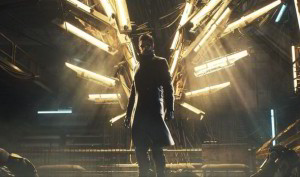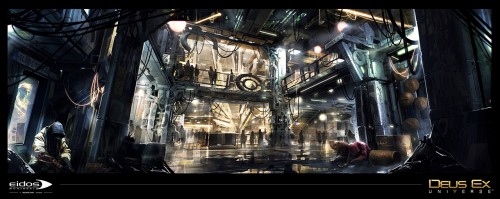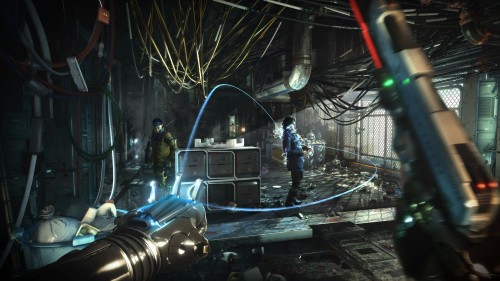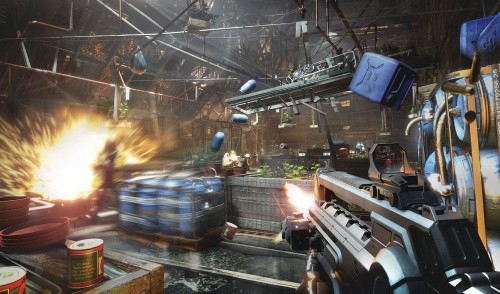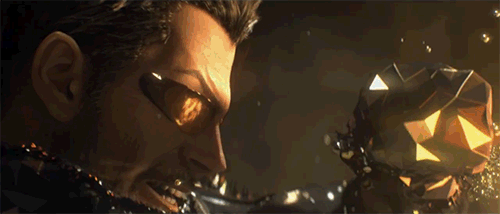Deep in a theatre in rainy Prague, bionic commando Adam Jensen is trapped in a closet. The door is the only exit, and that’s guarded by a bipedal robot loaded up with machine guns. There must be a way out; Deus Ex is all about choice.
I search for a vent, because there’s always a vent. But with the exception of a big bin, the room is empty. I have fled into the most featureless and poorly ventilated space in the Deus Ex universe. I consider my abilities: my electric dash will get me killed slightly faster than ambling into fire. Cloaking isn’t going to help either. I press a button to bring up my gun. From here you can switch ammo types, add silencers and tweak your scope. No armour-piercing rounds. Damn.
A frag grenade! Robots hate frag grenades. I open the door, toss the egg and close it again as the robot opens fire. WHUMP. I use my augmented vision mode to see through the wall and spot the robot lying still on its side. I crack the door. There’s a terrible whirring noise. The robot stirs, righting itself in a hideous tangle of legs. It’s not dead. It’s not dead at all.
I retreat into the room. This is Adam Jensen’s life now, this room. It’s an incongruous end for a man who has dedicated the two years since the events of Human Revolution to becoming the perfect walking weapon. Human Revolution Jensen was the improvised, slightly buggy prototype who could only punch two people before having to recharge his batteries. Mankind Divided Jensen is colder, harder and deadlier. Eidos Montreal refer to him as Jensen 2.0.

Jensen 2.0 has just come up with a very stupid plan. With the right upgrades Jensen can lift huge objects, like the massive bin sitting in the corner. I open the door and grab the fridge-sized object, hugging it against my belly for dear life. The robot opens fire, and the bin soaks up the bullets—it’s working! I bump the robot backwards. The robot’s guns fire point blank into the bin as we perform an absurd rotating waltz into the corridor. I’m a genius. I silently thank Prague council’s commitment to bin sturdiness and slowly back away. I make it fi ve steps before the bin breaks. I’m an idiot.
I’m also dead, but laughing. In Deus Ex: Mankind Divided, even a tiny and almost featureless room can create moments of emergent absurdity. “That’s exactly the kind of story that we look for,” gameplay director Patrick Fortier tells me. “We really believe in the strength of spontaneous moments. They’re really powerful, and we believe that they’re as exciting for players as the big scripted moments.”
I’m inclined to agree, and happy to discover that Mankind Divided is a solid continuation of the Human Revolution formula. In Mankind Divided Jensen flies all over the world as a special forces expert working for the Deus Ex equivalent of Interpol. The world is still reeling from Human Revolution’s techno-virus outbreak that turned augmented individuals into frenzied cyborg killers. Now augmented people are oppressed, segregated and treated as an underclass in what Eidos Montreal awkwardly refer to as a “mechanical apartheid”. Jensen wants to track down the Illuminati members responsible for the state of the world, and punch them with his big metal hands. As executive narrative director Mary DeMarle puts it: “he wants to meet the puppeteer, he doesn’t want to just be the puppet anymore.”
Mankind Divided will play out over a collection of hub zones, although Eidos Montreal hasn’t confirmed how many yet. The Prague level I explored takes place in one corner of a sizeable area—roughly two or three city blocks in size. The rest of the zone was locked off so I couldn’t explore first-hand, but the new hubs will be more populated and detailed than Human Revolution’s, thanks in large part to Mankind Divided’s new engine.
“It’s definitely a bigger monster than Human Revolution was,” says audio director Steve Szczepkowski. “In Human Revolution we could put maybe twelve people on screen that were moving, and then maybe another six static that would just sit and do their occupation. Well, that’s doubled.” The amount of dialogue has grown as a result. “I don’t remember what the total actor count is, but I know we’re already way over a hundred. And that’s with unique characters and all the factions we have so there’s a lot of voices. We’ve done a lot for the acting economy here in Montreal.”
Games like Metal Gear Solid V have changed our assumptions about what emergent sandbox games can be, but Deus Ex is about density rather than size. The Prague theatre is a warren, and there are plenty of ways in. You can climb in through a window into an office protected by a laser grid. Going left leads you to a couple of ladders that get you to the roof. There’s a vent there that drops you right into the bowels of the building. Go right and there’s a moving platform that you can activate using a biocell, the biological batteries used to recharge Jensen’s abilities. I used this platform to get a huge box onto a ledge, which I then jumped on to find a second way onto the roof. You can even enter through the beautiful glass dome on top of the theatre. Alternatively, if you want to test your guns, just walk in through the front door.
The level of detail far exceeds Human Revolution, which always felt constrained by its engine. There’s stuff to pick up and throw everywhere, which means I get to find out how guard robots respond to being hit with a traffic cone (they don’t like it). The streets are dark, rainy and atmospheric. I lure the poor robot down to a grimy public toilet where it sets off an EMP mine I planted earlier. I leave it collapsed just outside the gents, but just have time to admire how grotty the place feels. Human Revolution’s gold filter is gone, which frees the theatre’s lavish interiors to feel substantially different to the grimy city streets.
This artful clutter gives Eidos Montreal more ways to teach you about the world. You can hack into terminals to read emails and pick up news-pads, of course, but I also found a TV in the Prague level that showed a full length news report presented by Human Revolution’s news anchor, Eliza Cassan. If you know the truth about Eliza from Human Revolution, you might sense just a little bias in her reporting.
The leap in world fidelity means more graffiti, newspaper front pages that blow around the streets, and more detailed books, posters and road signs. It’s a richer place, and full of neat designs for weapons, robots and augmentations. Company logos and clothes subtly play on the recurring tessellated triangles motif of Human Revolution, and there’s a signature elegance to the technology. I couldn’t stop looking at Jensen’s arms—dark and tightly coiled, like armoured vipers.
Those arms can do marvellous things, and Prague is a great playground for Jensen’s new abilities. As in Human Revolution, he can cloak. He can use an aug that helps him to move silently. Titan armour can deflect bullets for a time. His close-combat retractable elbow chisels can now be fired at enemies. His knuckles can deploy multiple homing electrical shock bolts to a group of guards. Jensen is a heavily militarised Inspector Gadget, and feels remarkably powerful.
The power trip is sustained by a redesigned energy system. No longer are you constrained to a handful of energy pips. Instead, you have a bar of energy that depletes a little every time you activate an ability. For continuous abilities such as cloak, the remaining bar will gradually drain as you remain invisible. Energy used sustaining continuous abilities conveniently recharges, but the initial energy chunk you blow on ability activation can only be restored with a biocell.

With more juice, you can chain abilities together into monstrously satisfying combos. I used my Icarus dash to leap into the middle of a group of guards, and then immediately deployed my typhoon attack. The camera popped into third person and Jensen spun, shedding a spray of miniature warheads from his arms. You can combine abilities simultaneously with good results. Activate your silent feet aug and then dash, and you can quickly and silently close in for a close combat KO, for example. Close combat attacks still pop you into third-person view for a brutal miniature cutscene—Jensen has learned an especially handsome uppercut since Human Revolution.
Mankind Divided’s augmentations have been redesigned to solve a key issue with the first game, where choosing a stealthy, non-lethal approach mostly prevented you from using the game’s loudest and coolest toys. Mankind Divided tackles this by giving augmentations multiple functions, and non-lethal variants when necessary. If you choose, the typhoon attack can fire a spray of green gas bombs that incapacitate guards without killing them.
“Every time we add new augmentations we try to see how versatile they can be,” says Fortier. “Even something like the nano-blade—which thematically is more offensive because it’s a blade—you can still use it as a distraction as well, if you want to maintain stealth. We’re trying to think about augmentations in that way, that they can serve multi-purposes.”
I still haven’t found a clever second use for the amazing shock-blast, however. Human Revolution’s PEPS gun is now built into Jensen’s arm. Firing it hits the area in front of you with a massive concussive shockwave that sends enemies and any nearby detritus flying. It’s Deus Ex’s equivalent of Skyrim’s Fus Ro Dah dragon shout. The Icarus landing system also returns, cushioning long drops with a deeply satisfying golden electric forcefield. If you tap as you fall Jensen releases the forcefield as a destructive blast.
If you prefer a more subtle approach, try the hacking game. Cracking a complex device like a workstation sends you into a familiar minigame in which you capture nodes on a web. Each node you seize carries the chance of activating a countermeasure system that races to turn nodes red before you can take control of the device. Bonus nodes grant you extra currency and hacking power-ups, adding a fun element of risk-reward brinkmanship.
With the right upgrades you can also hack smaller devices such as security cameras quickly and at range. Jensen makes a safe-cracking gesture at the target and a box appears showing a soundwave with several spikes, and a line moving rapidly from left to right. As the line moves over the spikes, you can tap to remove them all and activate a disruptive affect. A range-hacked camera shuts down. A hacked security robot is temporarily disabled. The minigame is basic, but it turns hacking into an offensive tool that you can use in the middle of a gunfight. It speaks to the evolved philosophy of the sequel, which says that whether you opt to play loudly, quietly, lethally or non-lethally, most of Mankind Divided’s tools should be useful to you.

Even the core movement and cover systems have been refined. You can now dash a short distance from cover. The distance of the dash is indicated by a faint line. If it touches another point of shelter, a faint outline of Jensen shows that you’ll snap into cover at your new location. You can also dash into open ground to quickly close with an enemy, or make a hasty dash to a ladder or a vent without being spotted. It minimises the amount of time you spend slowly squat-stalking guards and makes stealth movement faster and more decisive.
Mankind Divided feels familiar, but from the cover system to the new augs, almost every system has been touched up. The result is a sleek power fantasy with enough sandbox freedom to let you own your anecdotes. I still have plenty of stories from my hours in Prague. I threw a sniper off his rooftop perch at the guards below, stole his rifle and cleared out the lobby from the streets. I’ve distracted guards with a traffic cone and walked right around them, invisible. All this in one small corner of the game. There’s still plenty more to discover about the story and the conversation systems, but Mankind Divided is a few months of polish away from being another great Deus Ex. We definitely asked for this.
























